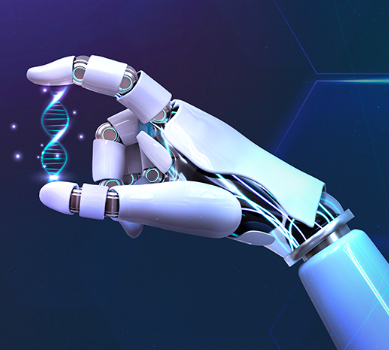
In today’s competitive business environment, artificial intelligence (AI) is changing the way companies approach digital marketing. AI-driven tools and technologies enable businesses to deeply understand their customers, deliver personalized experiences, and optimize marketing strategies with unprecedented accuracy. In this post, we’ll explore how AI is revolutionizing digital marketing, from predictive analytics to automation, and how businesses can leverage these technologies for better customer engagement and campaign success.
What is Digital Marketing?
Digital marketing involves using online channels and tools to promote products or services. These tools range from content management platforms to email marketing systems and social media management apps. AI technologies have now become an integral part of this space, allowing businesses to not only enhance customer interaction but also improve the efficiency and effectiveness of marketing campaigns.
AI’s Role in Digital Marketing
Artificial intelligence in digital marketing refers to the use of intelligent algorithms and machine learning models to optimize marketing processes. From automating tasks to personalizing content, AI makes it possible for marketers to deliver more relevant experiences to customers and make data-driven decisions that boost overall marketing performance. By harnessing AI, businesses can better understand consumer behavior, predict trends, and fine-tune their strategies in real-time.
Key Applications of AI in Digital Marketing
Here are some of the most impactful ways AI is being utilized to enhance digital marketing efforts:
1. Data Analysis
AI transforms data analysis by automating the processing and interpretation of large datasets. Unlike traditional methods, AI-driven analysis can handle vast amounts of data quickly, identifying patterns and providing actionable insights. With machine learning models, businesses can predict trends, forecast customer behaviors, and detect anomalies, all while reducing human error.
AI also empowers marketers to analyze unstructured data, such as text from social media or customer reviews, using natural language processing (NLP) techniques. This helps businesses better understand sentiment and customer feedback.
2. Personalization
AI allows businesses to provide personalized experiences by analyzing customer data and tailoring content to individual preferences. Machine learning algorithms track customer interactions and behavior across digital platforms, enabling businesses to suggest products, services, or content that align with each user’s unique interests. This personalized approach not only boosts customer satisfaction but also increases conversion rates and loyalty.
For example, AI can dynamically generate email content or website recommendations based on a customer’s previous behavior, ensuring that each interaction is relevant and timely.
3. Marketing Automation
AI significantly streamlines marketing efforts by automating repetitive tasks such as sending emails, managing social media posts, and optimizing ad campaigns. With AI-powered marketing automation platforms, businesses can create segmented email lists, schedule social media posts, and analyze engagement metrics automatically. This automation allows marketing teams to focus on more strategic efforts while maintaining a high level of efficiency.
AI also helps marketers predict the best times to send emails, post on social media, or target ads, ensuring content reaches the right audience at the most opportune moments.
4. Predictive Analytics
Predictive analytics uses AI to forecast future customer behavior, sales trends, and marketing campaign performance. By analyzing historical data, AI models can predict which customers are likely to make a purchase, what products are in demand, or which marketing tactics will yield the highest ROI. This data-driven foresight enables marketers to optimize their strategies and allocate resources more effectively.
For example, AI can predict seasonal sales trends, allowing businesses to stock products in advance, or it can forecast customer churn, prompting timely interventions to retain valuable clients.
5. Content Generation
AI is also transforming content creation. With natural language processing (NLP) and machine learning, businesses can automate the generation of written content, such as blog posts, product descriptions, and social media updates. AI content generators analyze existing content and produce new, relevant articles or copy that resonate with target audiences.
Furthermore, AI tools can optimize content for SEO, ensuring that it ranks well in search engines and reaches the right audience.
6. Customer Service Enhancement
AI-driven customer service tools, such as chatbots and virtual assistants, provide real-time support to customers. These systems can handle a wide range of customer queries, recommend products, and even process orders. By using NLP, chatbots can understand and respond to customer inquiries in a conversational manner, simulating human-like interactions.
AI-powered systems also learn from past interactions to improve responses over time, offering more accurate and helpful assistance. This not only improves customer satisfaction but also reduces response times and operational costs.
7. Sentiment Analysis
AI can analyze customer sentiment by examining text data from sources like social media, customer reviews, and emails. Sentiment analysis algorithms evaluate the emotional tone of customer feedback, helping businesses gauge customer satisfaction and identify areas for improvement.
Understanding customer sentiment allows marketers to adapt their strategies, address negative feedback, and highlight positive experiences, ultimately fostering a stronger relationship with their audience.
8. Dynamic Pricing
AI enables businesses to adjust pricing strategies in real-time based on market demand, competitor pricing, and customer behavior. With dynamic pricing algorithms, businesses can optimize prices for maximum profitability while remaining competitive. This approach is especially effective in industries like e-commerce, hospitality, and travel, where prices fluctuate based on supply and demand.
By using AI to determine the ideal price points, companies can offer personalized pricing or discounts to customers, which increases the likelihood of conversion.
9. Ad Targeting and Optimization
AI algorithms can optimize digital advertising by analyzing customer data to deliver personalized and targeted ads. By understanding a customer’s online behavior, preferences, and demographics, AI can display ads that are more relevant to each individual. This leads to higher engagement rates, better ad performance, and reduced wasted ad spend.
AI also helps marketers adjust bids in real-time for paid search campaigns, ensuring that ads are served to the most likely converters at the right time.
10. Customer Segmentation
AI helps businesses segment their customers more effectively by analyzing large sets of customer data. Using machine learning, AI can identify patterns and group customers based on behaviors, interests, and purchasing history. This segmentation enables more precise targeting of marketing efforts, ensuring that each customer receives relevant and personalized content.
By segmenting customers based on AI insights, businesses can improve the effectiveness of their marketing campaigns and build stronger relationships with their target audience.
Conclusion
AI is transforming the way businesses approach digital marketing, offering powerful tools that improve personalization, efficiency, and decision-making. By harnessing the power of AI, businesses can gain deeper insights into customer behavior, optimize their marketing efforts, and ultimately enhance customer satisfaction.
While there are challenges in implementing AI in marketing, the benefits far outweigh the hurdles. As AI continues to evolve, its role in digital marketing will only become more crucial, driving innovation and helping businesses stay ahead of the competition.












